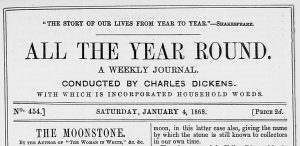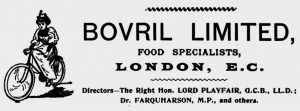We are very pleased to announce that the digital archival collections British Periodicals Collection I and British Periodicals Collection II have now been added to Jisc’s Journal Archives service and are available to authorised researchers with immediate effect. These collections, jointly known within the service simply as ‘British Periodicals’ were purchased from ProQuest by Jisc Collections and have been added to Journal Archives at no additional cost to subscribing institutions, where they may be accessed alongside collections of journal backfiles from the likes of Cambridge University Press, Brill, Oxford University Press, ProQuest’s Periodicals Archive Online and many others – including, at present, the digital archive of Spare Rib magazine*.
Accessible via the main Journal Archives interface or, in isolation, through a dedicated home page, British Periodicals is a highly valuable collection of digitised journals and magazines. With a timespan that ranges from before the Enlightenment, to the last days of the twentieth century’s inter-war years, British Periodicals supports research into a wide array of topics, including the history of science, literature, politics and the development of print culture itself. A characteristic strength of British Periodicals is the collections’ coverage of titles appearing during the Victorian explosion in popular publishing, as the means of production became cheaper and the demand for print matter, from an increasingly educated and literate public, grew.
Whether you are interested in the earliest appearance of novels that have stood the test of time to become established parts of the literary canon (as well as many that have faded from the cultural memory), wish to explore the contemporary responses to news events such as the death of a long-reigning monarch or you need to know more about the reception of scientific advances over more than two hundred years, there is much for to discover in British Periodicals:
- Classic works such as Great Expectations and the The Moonstone are to be found in the form in which a gripped public first encountered them – serialised across many months within the pages of journals such as Household Words and All The Year Round (both edited by Charles Dickens).
- The death of Queen Victoria was widely reported and commented upon in journals of the time, including the long-running The Saturday Review – which noted that ‘… our eyes were greeted with the strange announcement that “the King” was coming to London …’.
- In 1930, the same publication discussed the discovery of a new, ‘ninth’ planet – and was bold enough to propose the name ‘Perdita’ for what would become known and Pluto and yet have its full planetary status revoked many years later.
- Charles Booth’s ground-breaking work of social science Life and Labour of the People was published in 1889, shining an unsparing light into the conditions of the poor in London’s East end. Journals like To-Day (‘the monthly magazine of scientific socialism’) immediately found it to be “… by far the most authoritative account [i]n existence of London industrial life.”
- At the same time, Jack the Ripper was making his presence felt in the same districts, with horrifying effect. The ‘London serio-comic journal’ Judy, took aim at the capital’s police in its regular ‘Our Own Hurdy-Gurdy’ verse column and speculated satirically (and accurately) that the murderer would never be caught.
- Folklorists, looking for references to the other legendary nineteenth-century Jack – Spring-Heeled Jack – may like to note that his penetration into the popular consciousness was such that, in 1841, New Sporting Magazine listed a racehorse of that name, in their Index to Horses in the Racing Calendar.
- In addition to its depth of article content, British Periodicals is rich vein of ephemeral material, particularly regarding the history of advertising and its intersection with fields of study such as women’s history and the history of health and nutrition. Journals such as The Leisure Hour, Nash’s Pall Mall Magazine and The Ludgate, can furnish researchers with contemporary perspectives on the promotion and branding of products such as the ‘electric corset’ or testimonials to the power or still-well-known brands, like Bovril (which we can learn is of particular value to lady cyclists).
More than three and a half million articles are contained within British Periodicals – increasing the sum of content delivered through Journal Archives by around 50% – and representing a treasure trove of content for researchers of all disciplines and areas of interest. The service’s fast and effective search engine and title-level browsing, provides users with a range options from specific interrogation of the collections to serendipitous encounters with material which vividly brings to life the society of its day, with all of its concerns, attitudes, prejudices, insights and humour.
We at Jisc are delighted to be able to deliver British Periodicals through the Journal Archives service and hope that it will increase the use of this valuable resource and further enhance the work of our members and users. Please feel free to contact us with any questions about this update to Journal Archives and we will be happy to assist.
Stephen.Brooks@jisc.ac.uk
journalarchives@jisc.ac.uk
[*In the event of Britain exiting the European Union without an agreed deal and transition period, access to Spare Rib will suspended until further notice.]


